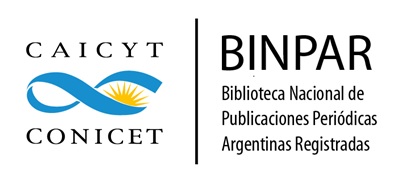The Establishment, the primordial point the caption in the (re)signification of Javier Milei's them
Articulation, antagonisms and border tracing, in the electoral debate of the Autonomous City of Buenos Aires
Keywords:
Establishment, Javier Milei, political discourse, hegemony, themAbstract
The 2021 elections, in Argentina, were held in a very particular context: The COVID-19 pandemic, added to the economic crisis inherited from the past government, and the incapacity of the current one to solve it, led to what the theorist Ernesto Laclau considers a «moment of dislocation in the structure». A proliferation of demands emerged in the political arena and began to dispute discourses that were based on social (Retamozo, 2009), from their articulation in the enunciations of parties and leaders of the «new right» (Natanson, 2020; Stefanoni, 2021), in Latin American.
In this regard, and understanding that it is essential that communication and political theory begin to analyze the discursive construction of these leaders and parties, this paper will address Javier Milei's enunciations about establishment in the CABA electoral debate, held on October 13, 2021.
Downloads
References
«Debate Capital en A DOS VOCES» (13/10/2021). En Todo Noticias., Ciudad Autónoma de Buenos Aires, Argentina. [Archivo de video]. Recuperado de https://www.youtube.com/watch?v=CWBpgMOyBzI .
Hayek, F. A. (1940). «La libertad y el sistema económico». En El Trimestre Económico, 4(24), 666-700. Recuperado de https://www.jstor.org/stable/20854350
Laclau, E. (2005). La razón populista. Ciudad Autónoma de Buenos Aires, Argentina: Fondo de Cultura Económica.
Laclau, E. y Mouffe, C. (1985). Hegemonía y estrategia socialista. Ciudad Autónoma de Buenos Aires, Argentina: Fondo de Cultura Económica.
Mouffe, C. (2018). Por un populismo de izquierda. Ciudad Autónoma de Buenos Aires, Argentina: Siglo XXI Editores Argentina.
-------------(2007). En torno a lo político. Buenos Aires, Argentina: Fondo de Cultura Económica.
Mouffe, C. y Errejón, I. (2015). Construir pueblo. Hegemonía y radicalización de la democracia. Barcelona, España: Icaria editorial, S.A.
Natanson, J. (diciembre 2020). Hablemos de la derecha democrática. Le Monde diplomatique. Recuperado de https://bit.ly/3iuD2R8 .
Pérez Cotten, A. C. (14 de marzo de 2020). Pablo Stefanoni: «Las nuevas derechas expresan insatisfacciones y enojos de parte de la sociedad». En Telam. Recuperado de https://www.telam.com.ar/notas/202103/547354-stefanoni-la-rebeldia-se-volvio-de-derecha.html
Retamozo, M. y Fernández Constantinides, M. N. (2010). «Discurso político e identidades políticas: producción, articulación y recepción en las obras de Eliseo Verón y Ernesto Laclau». En Cuadernos de H Ideas, 4 (4). Recuperado de https://bit.ly/3iyjOKj
Stefanoni, P. (2021). ¿La rebeldía se volvió de derecha? Ciudad Autónoma de Buenos Aires, Argentina: Siglo XXI Editores Argentina.
Downloads
Published
How to Cite
Issue
Section
License
Copyright (c) 2022 Juan Bautista Seco

This work is licensed under a Creative Commons Attribution-NonCommercial-ShareAlike 4.0 International License.
La aceptación de un original por parte de la revista implica la cesión no exclusiva de los derechos patrimoniales de los/as autores/as en favor del editor, quien permite la reutilización, luego de su edición (postprint), bajo una Licencia Creative Commons Atribución-NoComercial-CompartirIgual 4.0 Internacional (CC BY-NC-SA 4.0)
Acorde a estos términos, el material se puede compartir (copiar y redistribuir en cualquier medio o formato) y adaptar (remezclar, transformar y crear a partir del material otra obra), siempre que a) se cite la autoría y la fuente original de su publicación (revista y URL de la obra), b) no se use para fines comerciales y c) se mantengan los mismos términos de la licencia.
La cesión de derechos no exclusivos implica que luego de su edición (postprint) en Actas de periodismo y comunicación las/os autoras/es pueden publicar su trabajo en cualquier idioma, medio y formato; en tales casos, se solicita que se consigne que el material fue publicado originalmente en esta revista.
Tal cesión supone, también, la autorización de los/as autores/as para que el trabajo sea cosechado por SEDICI, el repositorio institucional de la Universidad Nacional de La Plata, y sea difundido en las bases de datos que el equipo editorial considere adecuadas para incrementar la visibilidad de la publicación y de sus autores/as.
Asimismo, la revista incentiva a las/os autoras/es para que luego de su publicación en Actas de periodismo y comunicación depositen sus producciones en otros repositorios institucionales y temáticos, bajo el principio de que ofrecer a la sociedad la producción científica y académica sin restricciones contribuye a un mayor intercambio del conocimiento global.






















